
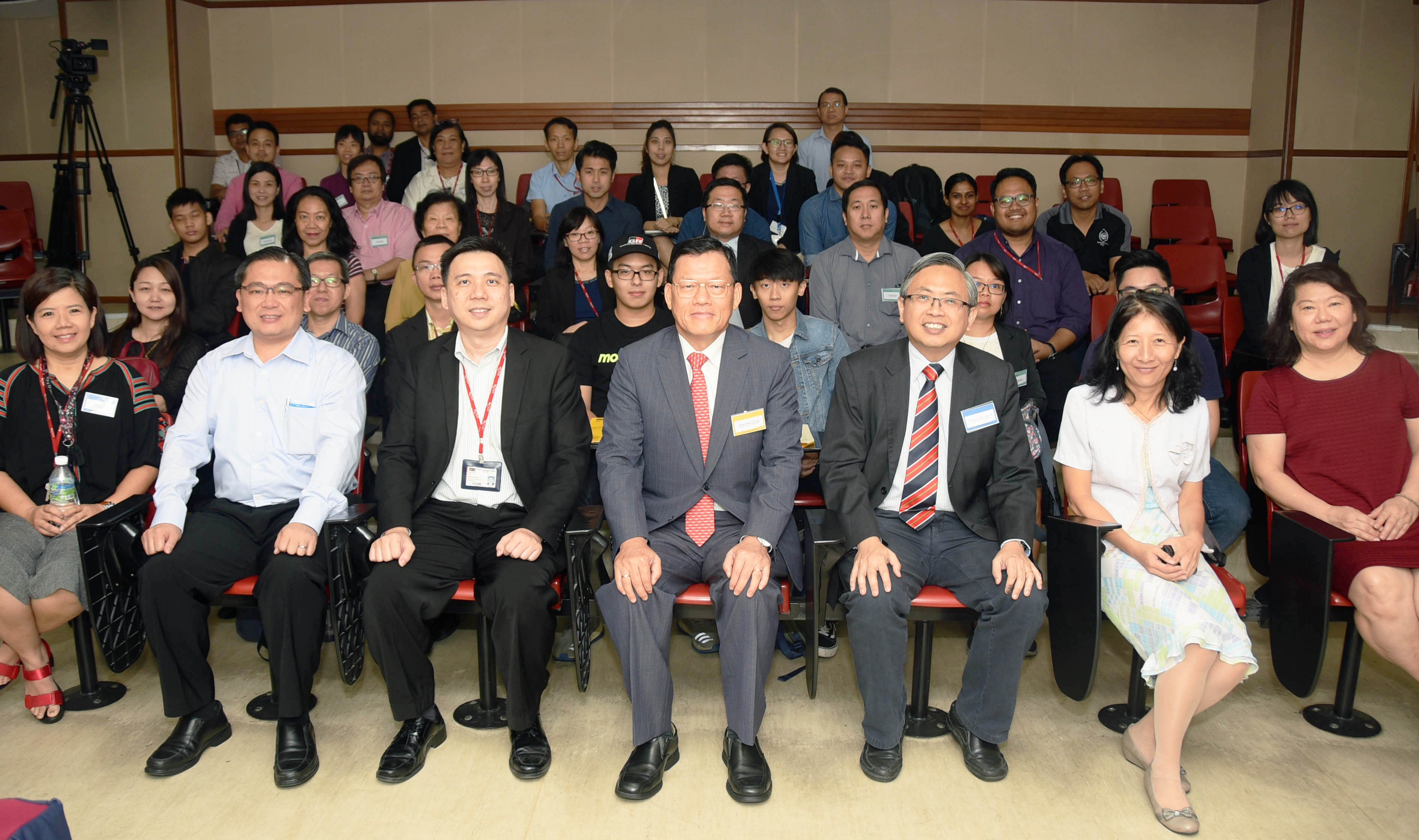
The VIPs with participants
Taipei Economic and Cultural Office (TECO) in Malaysia and UTAR Centre of Sustainable Architecture (COSA) jointly organised Taiwan Fellowship Forum 2018 at Sungai Long Campus on 16 May 2018. This half-day event served as a good opportunity for networking and sharing among current and past recipients, and potential applicants for Taiwan Fellowship.
Present at the forum were TECO Representative James Chang Chi-Ping, Deputy Representative Michael S. Y. Yiin, UTAR Vice President for Internationalisation and Academic Development Prof Ir Dr Ewe Hong Tat, Taiwan Scholarship Recipients’ Alumni Association President Anthony Loh Li Cheng, and UTAR COSA Chairperson Dr Lim Poh Im.
Speaking on behalf of TECO, James Chang said Taiwan has always maintain a very strong, close and longstanding collaborative relationship with Malaysia, particularly with the launching of New Southbound Policy in the year 2016. “Today’s forum is such a good platform to further enhance our collaborations. Through this forum, we are able to obtain more Malaysian scholars and experts for the Taiwan fellowship 2019,” he said.
On the other hand, Prof Ewe encouraged the students and the academics to take on collaborative research opportunities to expand the network as well as partake in knowledge exchange for mutual benefits and updates on the latest research development. He believed that the forum can create a greater awareness among the academics, graduates and the industry including the alumni that there were ample opportunities for collaborations to nurture talents, expand on research for new and more efficient ways of doing things while seeking new inventions for a better life.
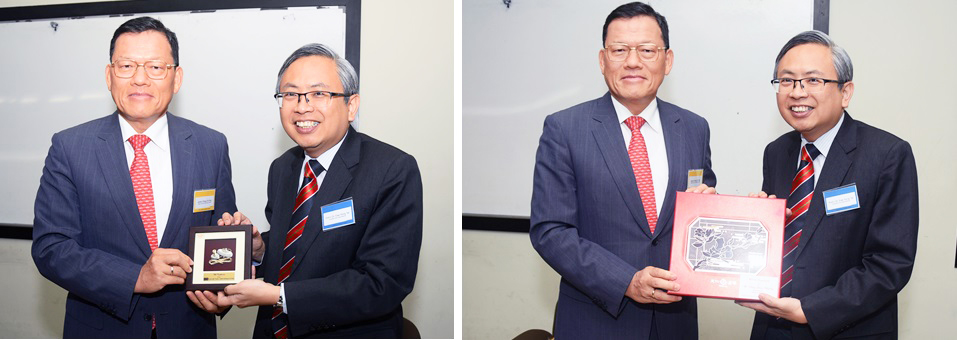
Souvenir exchange between James Chang (left) and Prof Ewe
The speakers who presented their research at the forum were Universiti Malaya Research and Innovation Office Deputy Vice Chancellor-cum-Institute of China Studies senior lecturer Dr Ling Tek Soon, Monash University Department of Economics Assoc Prof Dr Poon Wai Ching, Universiti Utara Malaysia College of Business Centre of Economics, Finance and Banking Assoc Prof Dr Lim Hock Eam, Universiti Sains Malaysia School of Distance Education Department of History lecturer Dr Low Choo Chin, and UTAR Contemporary China Studies Unit in Centre for Chinese Studies Research Head Dr Chin Chong Foh, Institute of Chinese Studies Assoc Prof Dr Khor Boon Eng, Faculty of Creative Industries lecturer Tan Wooi Yee.
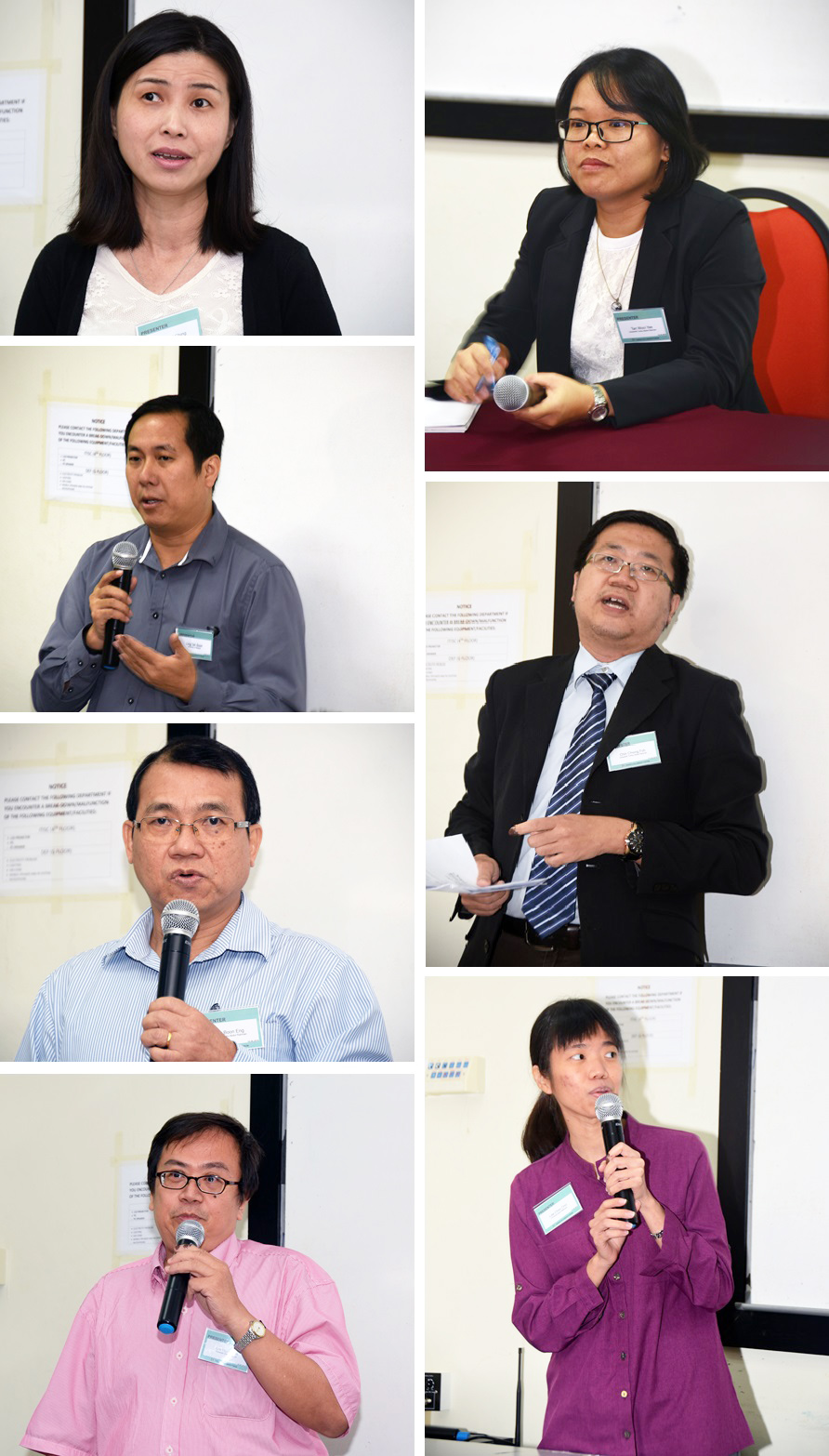
The speakers during their presentation
In his research, Dr Ling focused on the interaction and relationship between Kinmen and Xiamenin at a local level. He also examined the development of Kinmen as a site that borders People's Republic of China and Republic of China. Dr Poon, on the other hand, said that the Cobb-Douglas Utility Function that is widely used in the subject of microeconomic is infinitely improbably in the real world. She determined that a consumer can infer not only the preference ordering, but also the relative strengths of the preferences in making decision.
Dr Lim, with his research’s highlight on East-Asian happiness gap, said the effect of income on happiness of the country becomes insignificant once it is moderated by the societal values. He mentioned that the countries such as Japan and Singapore are performing well economically but poorly in happiness; whereas the other countries such as Philippine and Thailand are the happiest countries with the low level influence of income. On the other hand, Dr Low focused on the salient features of Taiwan’s naturalisation regime and the pressures for liberalisation. She analysed the two major nationality reforms in 2000 and 2016 in her research and showed that the changes and continuity of the citizenship regime are the products of both ethno-cultural of understandings of nationhood and economic pragmatism.
In his presentation, Dr Chin mainly talked about the diplomatic relations between Republic of China and Malaysia prior to 1974 based on the related archival data from Ministry of Foreign affairs Archives, Taiwan. He divided the development of the relationship between Republic of China and Malaysia into four period and concluded that the relationship between the two countries was close and significant since their formation.
On the other hand, Dr Khor conducted a case study of three female writers namely Xie Bing ying, Zhong Mei Yin, and Su Xuelin. His study focused on their cross-border experiences and literary writings. He also analysed how these three writers played a role to promote literary and cultural exchanges; while Dr Tan explained that China’s energy diplomacy toward Malaysia may not contribute significantly to China’s overall energy security, however it has enhanced energy ties between the two countries. She concluded that Malaysian government needs to be aware of the Chinese greater strategic objectives in the region while receiving investments and technologies from the Chinese enterprises.
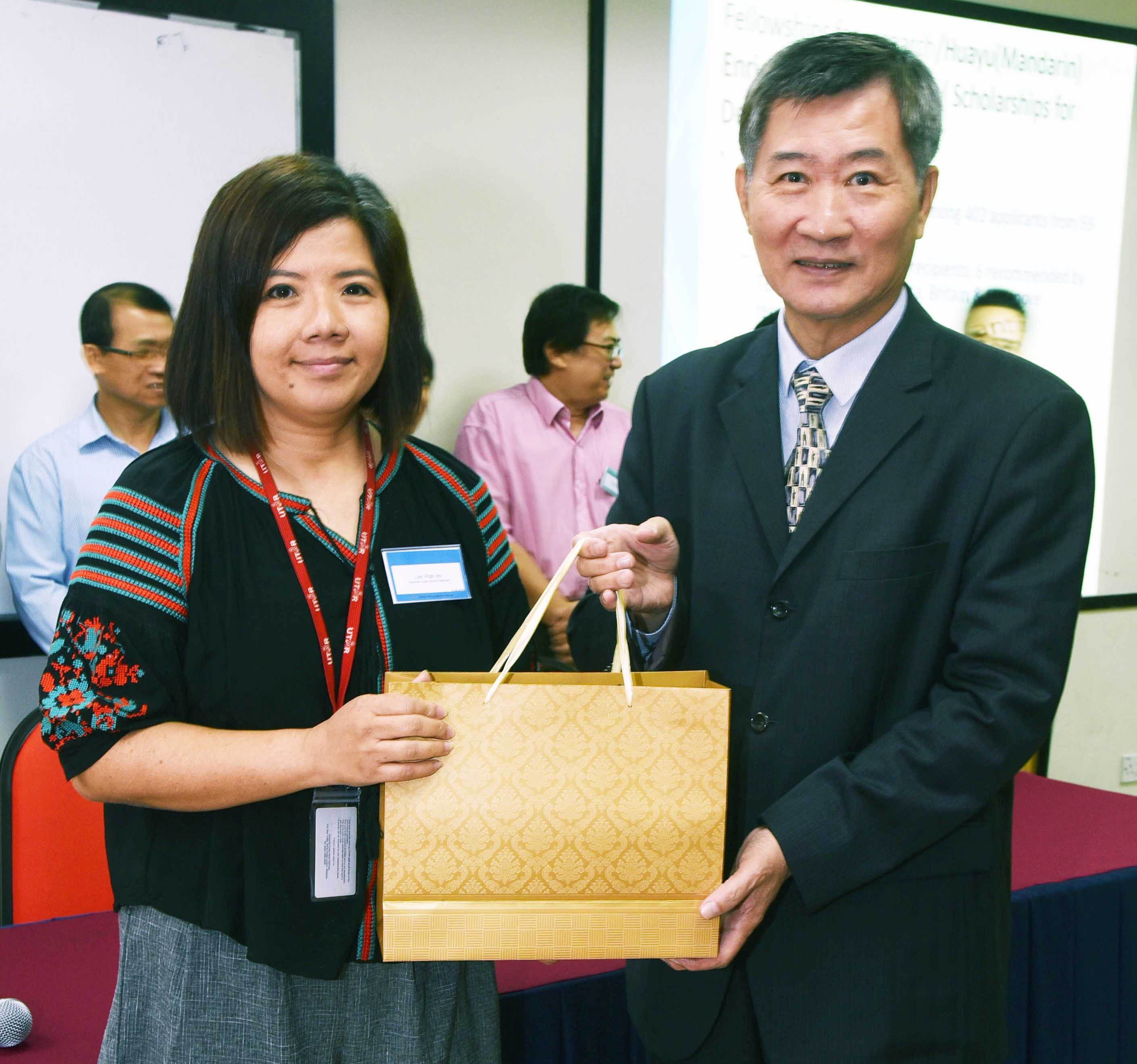
Dr Lim presenting a token of appreciation to Michael Yiin
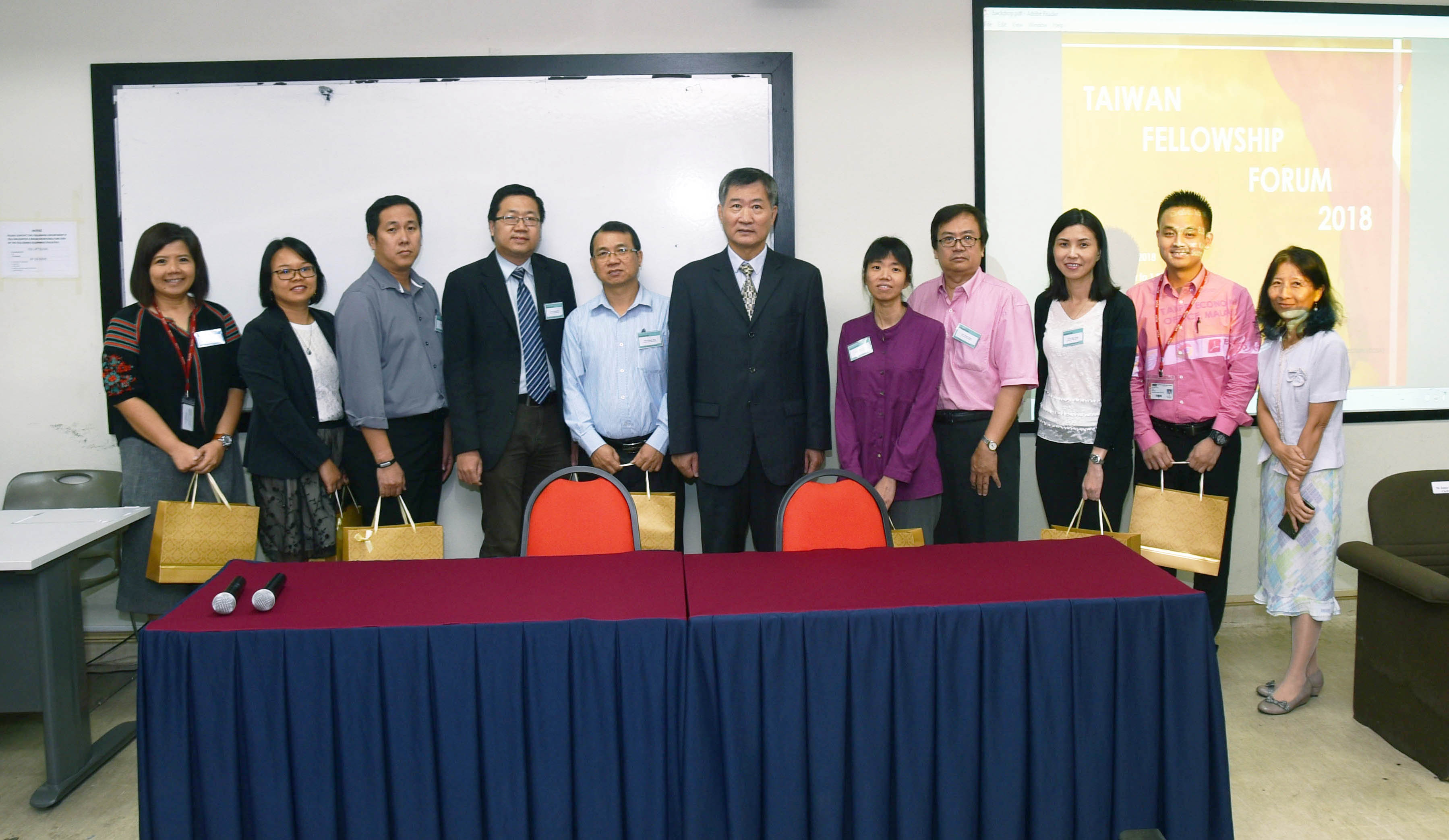
From left: Dr Lim, Dr Tan, Dr Ling, Dr Chin, Dr Khor, Michael Yiin, Dr Low, Dr Lim Hock Eam, Dr Poon, Moderator Dr Ho Ying Chan, and Catalina Chuo
During the Forum, TECO also provided a briefing on the procedures of the Taiwan Fellowships application. It was presented by its Secretary Catalina Chuo. Question-and-answer session was also conducted to deepen the attendees’ understanding and obtain potential applicants.
Taiwan Fellowship is an international fellowship that provides a platform to international scholars to conduct research related to Taiwan, cross-strait relations, mainland China, the Asia Pacific and Sinology. The Fellowship is open to scholars in wide areas, from arts and language, to industrial development, market and investment, economics and commerce as well as international cooperation. The fellowship is for a duration from three months to one year. It covers a monthly stipend and a round-trip air ticket between the recipient's country of residence and Taiwan.
To know more about the fellowship, visit http://taiwanfellowship.ncl.edu.tw
© 2019 UNIVERSITI TUNKU ABDUL RAHMAN DU012(A).
Wholly owned by UTAR Education Foundation Co. No. 578227-M LEGAL STATEMENT TERM OF USAGE PRIVACY NOTICE